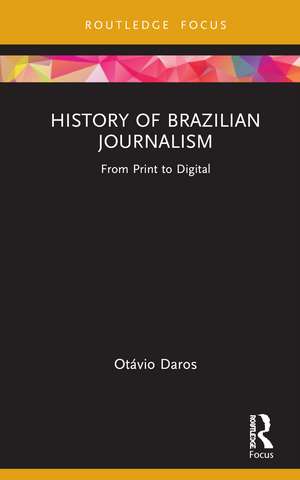History of Brazilian Journalism: From Print to Digital: Routledge Focus on Communication and Society
Autor Otávio Darosen Limba Engleză Hardback – 13 dec 2024
The author suggests that Brazilian journalism has so far known four phases: doctrinal political journalism, narrative literary journalism, industrial news journalism, and multimedia infotainment journalism. Devoting a chapter to each phase, Daros presents a critical map of the genesis and metamorphosis of journalistic practices in the country. The analysis goes beyond a mere study of national history to mark the points of connection between the Brazilian case and other geographic spaces, showing how the profession moved between two Western paradigms and was continually shaped by the economic, political, and cultural context from which it emerged and was inserted. The final part of the book reflects critically on the state of Brazilian journalism today, considering the new social media culture, the increasing focus on costs over quality of news products, and the failed social responsibility of the profession to inform national public opinion.
This study is an important touchstone for researchers of Brazilian and Latin American journalism and those interested in the ways in which the media shapes and is shaped by a country’s socio-political climate.
Preț: 384.96 lei
Nou
Puncte Express: 577
Preț estimativ în valută:
73.69€ • 80.07$ • 61.94£
73.69€ • 80.07$ • 61.94£
Carte disponibilă
Livrare economică 31 martie-14 aprilie
Livrare express 14-20 martie pentru 26.00 lei
Preluare comenzi: 021 569.72.76
Specificații
ISBN-13: 9781032755809
ISBN-10: 1032755806
Pagini: 142
Dimensiuni: 138 x 216 x 14 mm
Greutate: 0.28 kg
Ediția:1
Editura: Taylor & Francis
Colecția Routledge
Seria Routledge Focus on Communication and Society
Locul publicării:Oxford, United Kingdom
ISBN-10: 1032755806
Pagini: 142
Dimensiuni: 138 x 216 x 14 mm
Greutate: 0.28 kg
Ediția:1
Editura: Taylor & Francis
Colecția Routledge
Seria Routledge Focus on Communication and Society
Locul publicării:Oxford, United Kingdom
Public țintă
Postgraduate and Undergraduate AdvancedCuprins
Acknowledgements
Chapter 1: Introduction
Chapter 3: Informative Literary Journalism
Chapter 4: Industrial News Journalism
Chapter 3: Multimedia Content Journalism
Chapter 6: Closing Remarks
Index
Chapter 1: Introduction
A critical theory of the history of journalism
Framework for the study of the Brazilian caseChapter 2: Political Doctrinaire Journalism
A colony without periodical press
The first journal and exile journalism
Gazettes and the printing monopoly
Pasquinade after the end of censorship
Emergence of daily newspapers
Chapter 3: Informative Literary Journalism
Decline of the partisan and community press
Renewal of journalism through literary magazines
Expansion of the mainstream across the country
Birth of media chains and their barons
Rise of modern journalism amid authoritarianism
Chapter 4: Industrial News Journalism
The North American influence on Brazilian journalism
Mainstream and alternative press in the Military Dictatorship
Media conglomerates and the news industry
Establishment and predominance of broadcasting journalism
Specialization and professionalization of newsrooms
Chapter 3: Multimedia Content Journalism
Popular journalism and the new middle class
The digitization of the press and news websites
All-news broadcasting and media convergence
Professional and amateur in the context of crisis
Metamorphosis of contemporary journalism
Chapter 6: Closing Remarks
Index
Notă biografică
Otávio Daros is Postdoctoral Researcher and Collaborating Professor in the Postgraduate Program in Communication at the Pontifical Catholic University of Rio Grande do Sul. He is the author of the book Writing Journalism History: The Press and Academia in Brazil, a historiography of knowledge production in journalism. His articles have been published in journals such as Communication Theory and Media, Culture & Society.
Descriere
This book constitutes a first-of-its-kind synthesis of the development of journalism in Brazil, considering both its mediations with national social and political life and its relationships of influence and dependence on international economic centers.









